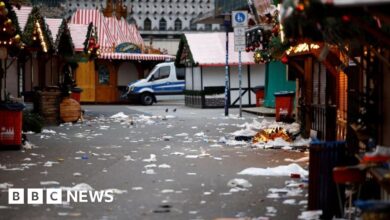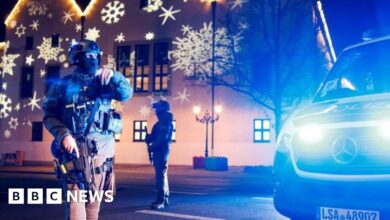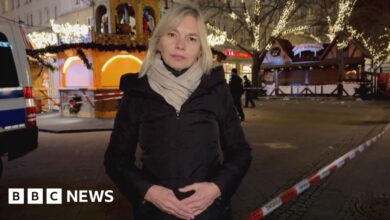Sri Lanka votes in first election since protests ousted leader
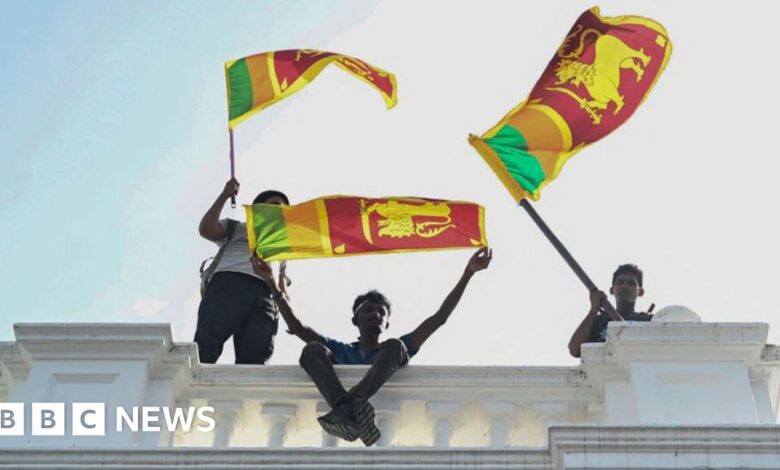
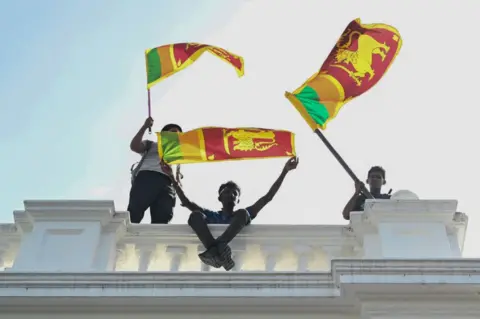 Getty Images
Getty ImagesPolls have closed in Sri Lanka’s election, where voters elected a new president for the first time since mass protests ousted the country’s leader in 2022.
Saturday’s vote is widely seen as a referendum on economic reforms aimed at putting the country on a path to recovery from its worst-ever financial crisis.
But many people are still struggling to make ends meet because of rising taxes and cuts to benefits and welfare.
Many analysts predict that economic concerns will be top of mind for voters in what is expected to be a tight race.
Counting of votes began with mail-in ballots at 17:00 local time (11:30 GMT), but results are not expected to be clear until Sunday morning.
“Skyrocketing inflation, soaring living costs and the country’s poverty have left voters desperate for price stability and improved livelihoods,” Soumya Bhowmick, a fellow at the India-based Observer Research Foundation, told the BBC.
“As the country seeks to emerge from its economic collapse, this election serves as a pivotal moment in shaping Sri Lanka’s recovery path and restoring domestic and international confidence in its governance.”
President Ranil Wickremesinghe, who has been tasked with the enormous task of pulling Sri Lanka out of its economic crisis, is seeking another term.
The 75-year-old was appointed by parliament a week after former president Gotabaya Rajapaksa was ousted from power.
Soon after taking office, Wickremesinghe cracked down on what remained of the protest movement. He has also been accused of shielding the Rajapaksa family from prosecution and allowing them to regroup—charges he has denied.
Another strong candidate is leftist politician Anura Kumara Dissanayake, whose anti-corruption agenda has enjoyed growing public support.
There are more candidates running in Saturday’s election than any other in Sri Lanka’s history. But of the more than three dozen, four are dominating.
In addition to Wickremesinghe and Dissanayake, there was also opposition leader Sajith Premadasa and the ousted president’s 38-year-old nephew Namal Rajapaksa.
An economy in crisis
The “Aragalaya” (struggle) uprising that ousted former president Gotabaya Rajapaksa erupted due to the economic crisis.
Years of low taxes, weak exports and major policy mistakes, combined with the Covid-19 pandemic, have depleted the country’s foreign exchange reserves. Public debt has ballooned to more than $83 billion and inflation has soared to 70%.
While the country’s social and political elites were largely shielded from the consequences, essentials such as food, cooking gas and medicine became scarce for ordinary people, fueling anger and unrest.
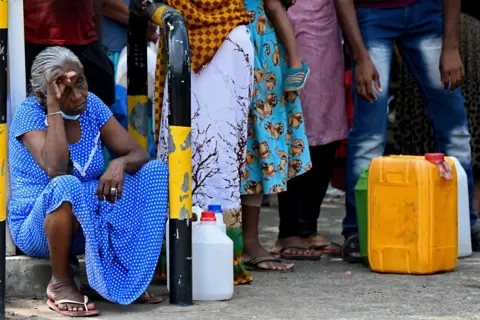 Getty Images
Getty ImagesPresident Rajapaksa and his government were blamed for the crisis, leading to months of protests calling for his resignation.
On July 13, 2022, in dramatic scenes broadcast around the world, the mob stormed the presidential palace, jumped into the swimming pool and ransacked the house.
After Rajapaksa fled the country – a 50-day exile – President Wickremesinghe’s interim government imposed strict austerity measures to save the economy.
Although economic reforms have been successful in lowering inflation and appreciating the Sri Lankan rupee, the Sri Lankan people continue to feel the pinch.
“Jobs were the hardest thing to find,” said Yeshan Jayalath, 32. “Even with an accounting degree, I couldn’t find a permanent job.” Instead, he took on temporary or part-time jobs.
Many small businesses across the country are still struggling through the crisis.
Norbet Fernando, who was forced to close his roof tile factory north of Colombo in 2022, told the BBC that raw materials such as clay, wood and kerosene were three times more expensive than they were two years ago. Few people were building houses or buying roof tiles, he added.
“After 35 years, it breaks my heart to see my factory destroyed,” Fernando told the BBC, adding that of the 800 tile factories in the area, only 42 will remain operational as of 2022.
Central bank data on business sentiment shows demand falling in 2022 and 2023 – and while the situation improves in 2024, it is still not back to pre-crisis levels.
“The Sri Lankan economy has now recovered, but many people still need to be convinced that the price has been worth it,” Alan Keenan, senior adviser on Sri Lanka at the International Crisis Group (ICG), told the BBC.
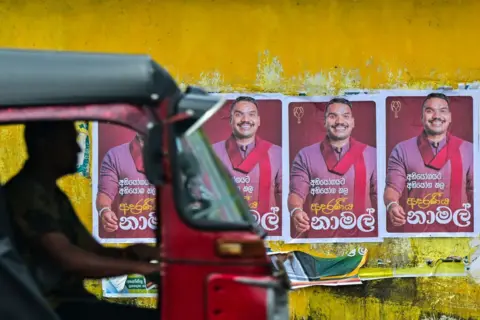 Getty Images
Getty ImagesWho is the main candidate?
Ranil Wickremesinghe: Having previously lost two presidential elections, Saturday marks his third chance to be elected by the Sri Lankan people, rather than parliament.
Anura Kumara Dissanayake: The candidate of the left-wing National People’s Party coalition promises tough anti-corruption measures and good governance.
Mr. Sajith Premadasa: The opposition leader is representing the Samagi Jana Balawegaya party – his father was the second executive president of Sri Lanka before being assassinated in 1993.
Namal Rajapaksa: The son of Mahinda Rajapaksa, who led the country from 2005 to 2015, he comes from a powerful political lineage, but will need to win over voters who blame his family for the economic crisis.
How does voting work?
Voters in Sri Lanka elect a single winner by ranking up to three candidates in order of preference.
If a candidate receives an absolute majority of votes, they are declared the winner. If not, a second round of counting begins, taking into account the second and third votes.
No election in Sri Lanka has ever progressed to a second round of counting, as single candidates have always emerged as clear winners based on first preference votes.
This year may be different.
“Early polls and campaigning suggest the vote is likely to produce a winner for the first time without a majority of the vote,” said ICG’s Mr Keenan.
“Candidates, party leaders and election officials must be prepared to resolve any disputes that may arise calmly and in accordance with established procedures.”



